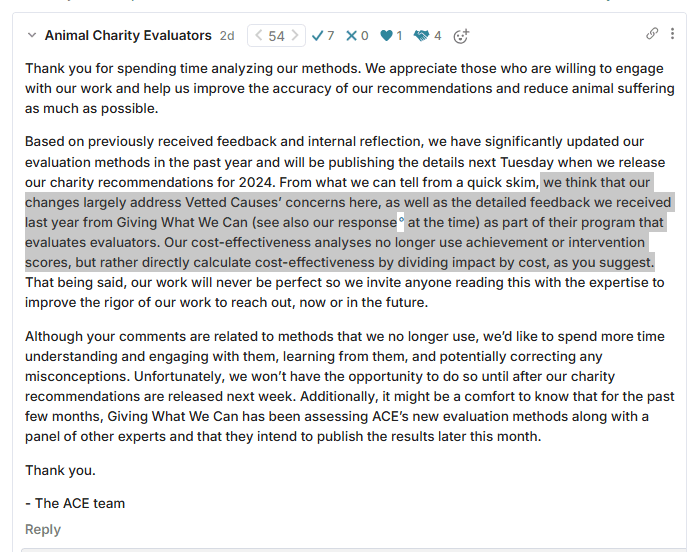Hi everyone,
Recently, I decided to read one of ACE’s charity evaluations in detail, and I was extremely disappointed with what I read. I felt that ACE's charity evaluation was long and wordy, but said very little.
Upon further investigation, I realized that ACE’s methodology for evaluating charities often rates charities more cost-effective for spending more money to achieve the exact same results. This rewards charities for being inefficient, and punishes them for being efficient.
ACE’s poor evaluation process leads to ineffective charities receiving recommendations, and many animals are suffering as a result. After realizing this, I decided to start a new charity evaluator for animal charities called Vetted Causes. We wrote our first charity evaluation assessing ACE, and you can read it by clicking the attached link.
Best,
Isaac




It feels like this needs a response from both ACE and Legal Impact for Chickens. (I'm not suggesting it should be a quick one, some things are important enough to warrant careful review. I agree with @abrahamrowe it would probably have been better to ask for their comments before publishing)
I think this would have been an interesting contribution to the Animal Welfare vs GHD debate week. From the limited amount I read of it, it seemed that even people (on different sides of the debate) whose analysis was very thorough weren't taking account the more straightforward possibility that some of the highlighted top animal advocacy charities simply weren't close to being as effective [yet] at achieving their goals as suggested, regardless of philosophical positions and empirical claims about welfare levels.
I agree with this, and particularly agree that the quote you highlighted below does not seem like good justification. I also think your comment (elsewhere in this thread) that their track record is a "bad one" might be going a little too far.[1] As I say, I was surprised to find that LIC had not yet had any legal success, given that I'd heard about them mostly through hear... (read more)